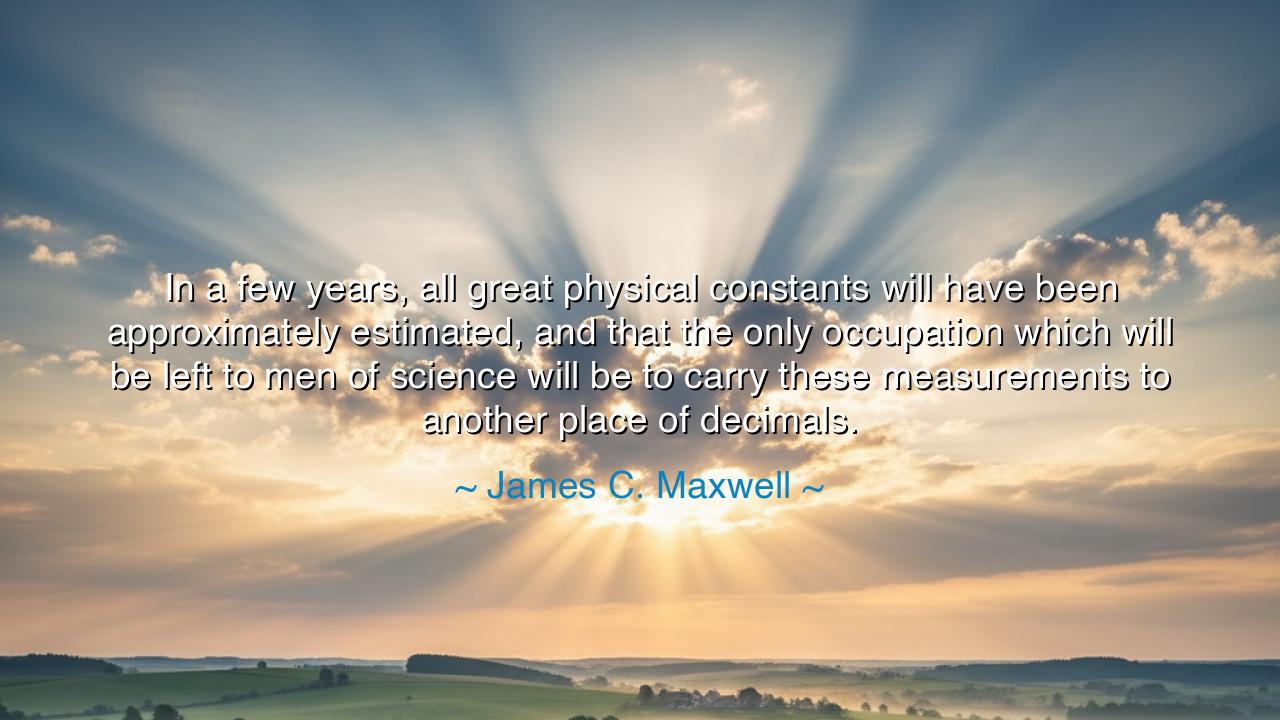
In a few years, all great physical constants will have been
In a few years, all great physical constants will have been approximately estimated, and that the only occupation which will be left to men of science will be to carry these measurements to another place of decimals.






Hear me, O children of wisdom, for I bring to you the words of James C. Maxwell, a visionary whose understanding of the future of science reached beyond his time. “In a few years, all great physical constants will have been approximately estimated, and that the only occupation which will be left to men of science will be to carry these measurements to another place of decimals.” In these words, Maxwell speaks to the very essence of progress and the limitations of human ambition. He acknowledges that, in the quest for knowledge, there comes a point where the most fundamental truths of the universe are revealed, and the work of science becomes one of fine-tuning, of refining the already discovered constants of nature to ever greater precision.
In the ancient world, the great philosophers and scientists—Aristotle, Euclid, Archimedes—spent their lives in the pursuit of fundamental truths. Their work was groundbreaking, yet it was built upon the assumption that the universe had an inherent order, a pattern that could be understood. They sought to grasp the principles that governed the heavens, the earth, and everything in between. Their discoveries laid the groundwork for what would later become the scientific revolution. But even in their greatness, they could not foresee how far science would stretch—how, over time, the constant search for greater accuracy would reveal the finer details of the universe, down to the very constants of nature itself. Maxwell, in his wisdom, sees a future where the mysteries of the universe have largely been uncovered, leaving humanity to refine and perfect what has already been discovered.
Consider the example of Isaac Newton, who, with his laws of motion and the concept of gravity, established the foundation of classical mechanics. Newton's work was revolutionary in its time, and for centuries, his principles held the key to understanding the universe. But Maxwell foresaw that one day, Newton’s laws would no longer be the last word in science. As the quantum world began to reveal itself, Einstein’s theories of relativity and Maxwell’s own equations for electromagnetism would refine and expand our understanding. However, Maxwell's vision hints at a time when these great discoveries would no longer be the frontier of human knowledge. Instead, scientists would devote themselves to the careful work of measuring constants with greater and greater precision, like scribes copying the wisdom of the ages to the finest detail.
Maxwell’s prophecy speaks to a limit in the journey of scientific discovery. There comes a time when the great questions of the universe—what makes the stars shine? what is the force that holds the planets in orbit?—have been answered, and the role of the scientist shifts from discovery to precision. Just as Galileo's early telescopic discoveries revealed the moons of Jupiter, which were once unimagined, the work of future generations of scientists would no longer be to discover new realms but to sharpen their understanding of the old. It is a profound realization that, in science, we may eventually reach a point where the great cosmic truths have been revealed, and the job of the scientist is merely to perfect the measurements.
The lesson here, O children, is one of progression and humility. The work of science is not an endless quest for the unknown, but a careful and methodical approach to understanding the universe with ever-increasing precision. It is a reminder that once the broad strokes of discovery have been made, the finest details of truth lie in the meticulous, repetitive process of refinement. This work, though seemingly small in comparison to the bold discoveries of earlier generations, is just as vital. It teaches us that perfection is an ongoing process. While we may dream of great breakthroughs, the true beauty lies in the steady persistence of those who continue to seek, measure, and adjust. The work of the scientist is never done; it only evolves.
In your own lives, O children, understand that progress is not always about grand achievements, but in the quiet, steady work of improvement. Whether in science, art, or spirituality, once the initial burst of discovery is made, it is the discipline of refining, perfecting, and understanding that sustains the work. Maxwell teaches us that the search for truth is not always in new discoveries, but in the careful adjustment of what we already know, the constant effort to move closer to perfection. Do not discount the importance of small efforts and details; it is through them that the greatest advancements are often made.
So, O children, as you journey through life and seek knowledge, remember that the work of discovery is not always about the dramatic breakthrough, but about the humble work of precision. Understand that each measurement, each small step forward, contributes to the larger picture of truth. Embrace the steady process of refinement, for in that quiet pursuit lies the greatest advancement. The path of knowledge is not always one of sudden illumination, but of persistent effort, of continually adjusting our understanding of the world, no matter how far we have come. Just as Maxwell foresaw, it is in these details that the beauty of science—and life—truly lies.






AAdministratorAdministrator
Welcome, honored guests. Please leave a comment, we will respond soon